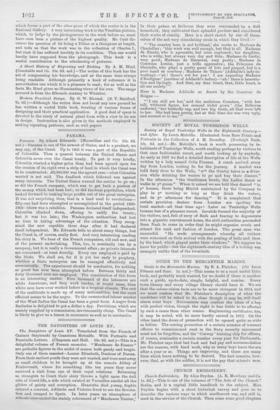PANAMA.
Panama. By Albert Edwards. (Macmillan and Co. 10s. 6d. not.)—Panama is one of the newest of States, and is a product, we may say, of the Canal. Up to 1903 it was a part of the Republic of Colombia. Then a quarrel between the United States and Colombia arose over the Canal treaty. To put it very briefly, Colombia ,wanted a higher price than had been agreed upon for the cession of its right over a strip of land in which the Canal was to be constructed: .62,000,000 was the agreed sum—what Colombia wanted is not said. The deadlock which followed was against many interests. The United States wanted the matter to go on ; so did the French company, which was to get back a portion of the money which had been lost; so did the local population, which looked forward to making large profits out of the great enterprise. It was not surprising, then, that in a land used to revolutions— fifty-one had been attempted or accomplished in the period 1850- 1902—there was a rebellion. Panama declared itself independent. Colombia climbed down, offering to ratify the treaty; but it was too late ; the Washington authorities had lost no time in taking advantage of the situation. They recog- nized the new republic three days after it had declared itself independent. Mr. Edwards tells us about many things, but the Canal is, of course, easily first. And very interesting reading his story is. We hear of the French companies, old and new, and of the present undertaking. This, too, is nominally run by a company, but it is really a Government affair ; no private interests are concerned—at least directly. Every one employed is paid by the State. We shall see, for it is yet too early to prophesy, whether a State enterprise can be managed effectively and economically. The experiment should be conclusive, for nothing so great has ever been attempted before. Between thirty and forty thousand men are employed. The constitution of this force is an interesting matter. Five thousand of the labourers are 'white Americans, and they work harder, it would seem, than white men have over worked before in a tropical climate. The rest of the multitude is made up of many nationalities, but the most efficient seems to be the negro. To the overstocked labour market of the West Indies the Canal has been a great boon. A negro from Barbados is delighted to get a dollar a day. Provisions, which are mainly supplied by a commission, are reasonably cheap. The Canal is likely to give us a lesson in economics as well as in mechanics.






















































 Previous page
Previous page